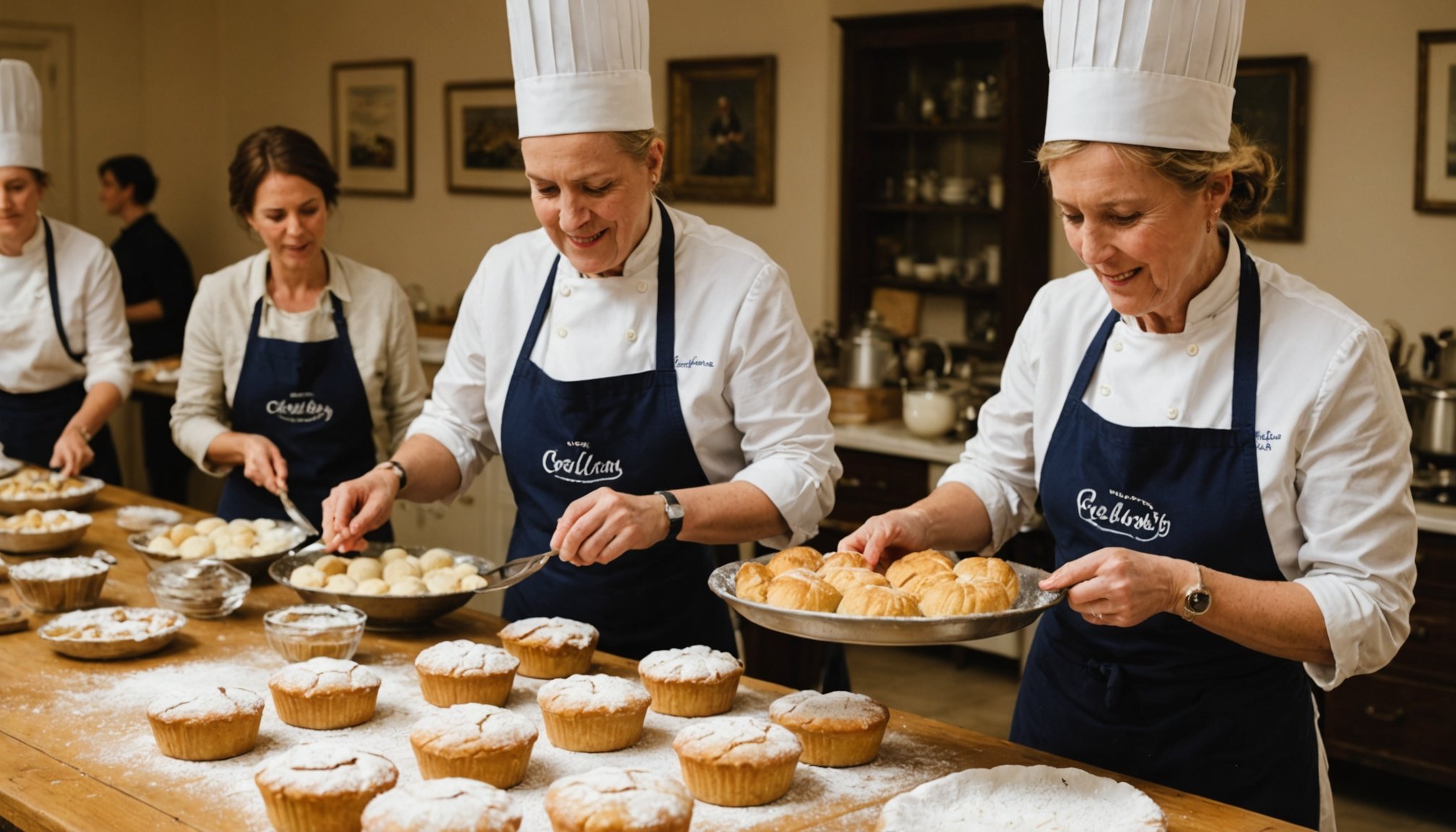Overview of Authentic English Baking Classes
Authentic English baking classes offer more than just recipes; they provide a cultural immersion into the traditional baking landscape of England. These classes are designed to teach participants about the unique techniques and historical significance behind classic English baked goods. By engaging in these experiences, attendees gain an understanding of the rich heritage and traditions that have shaped English baking.
One of the defining traits of authentic English baking classes is their emphasis on preserving the original methods passed down through generations. This ensures that learners are not only acquainted with the ingredients but also the traditional techniques central to baking authentically.
In parallel : Discover the Best Places to Join an Authentic British Baking Class!
Cultural immersion is a crucial aspect of these baking experiences. It allows participants to appreciate the societal and historical context of English pastries and breads. Engaging in such classes often means experiencing the broader cultural rituals associated with English baking, such as afternoon teas and regional specialties.
Among the popular baked goods featured in these classes are scones, Victoria sponge cakes, and Cornish pasties. Each type of pastry or bread has its own set of unique characteristics and historical roots, providing a delightful learning journey that combines both culinary skill and cultural education.
Also to see : Explore Liverpool”s Maritime Heritage: Join an Engaging Guided Tour Today!
Recommended Locations for Baking Classes
Joining a baking workshop can be a delightful experience, offering hands-on learning and a way to meet fellow enthusiasts. Here are some top locations renowned for their English cooking studios and standout experiences.
Location 1: The Bakehouse Academy
At The Bakehouse Academy, courses are meticulously structured into small, intensive sessions. Each baking workshop guides you through complex techniques with ease. Pricing is competitive, with packages starting at £150 for a weekend course. Unique to this academy is their emphasis on using organic local ingredients, enhancing both flavour and learning experience.
Location 2: Sheffield’s Sconery
Renowned for its best baking schools status, Sheffield’s Sconery offers diverse classes from artisanal bread to intricate pastries. Classes typically run for three hours at £45 each. These sessions not only cover traditional recipes but also experiments with modern twists, ensuring an engaging experience.
Location 3: Ye Olde Baker’s Guild
Nestled in the heart of London, Ye Olde Baker’s Guild prides itself on its interactive baking workshops. Their courses blend history with baking, offering insights into the English baking heritage. With a pricing model of £60 per class, the Guild provides unique extras, such as a customary afternoon tea service.
Instructors and Expertise
In the world of baking, the guidance of expert instructors is invaluable. Instructors with a background in the culinary arts bring not only their wealth of knowledge but also their hands-on experience to the classroom. Their qualifications often include formal training from renowned culinary institutes and years of practising as experienced bakers in professional settings. This depth of expertise allows them to impart more than just recipes; they teach the science and art behind baking.
These instructors employ varied teaching methods to cater to different learning styles. From live demonstrations to interactive sessions, they ensure that each class is a blend of theory and practice. Some might prefer a more structured syllabus, while others focus on creative experimentation, encouraging students to push the boundaries of traditional baking techniques.
The importance of learning from such seasoned professionals cannot be overstated. Mastering baking techniques requires more than following steps; it demands an understanding of the process and the ability to adapt. The expertise of these instructors provides students with the confidence and foundation to explore baking in depth, fostering a learning environment that goes beyond the basics to enhance skills and creativity.
Class Formats and Experiences
Different baking class formats cater to various learning preferences, allowing enthusiasts to choose the most suitable approach. Hands-on experiences are a popular choice, providing students with a tactile learning environment. In these sessions, participants engage directly with ingredients, tools, and techniques, which enhances understanding and retention. The interactive nature of hands-on classes often leads to a vibrant, engaging atmosphere, with students and instructors exchanging ideas and tips.
For those who prefer demonstration-style sessions, baking class formats involve observing a professional instructor baking and explaining each step. Although less interactive, this format allows participants to focus on absorbing detailed techniques and asking questions as needed. Demonstrations can provide a clear view of professional practices that can be applied at home.
Virtual options have gained traction, particularly for those who are unable to attend in-person classes. These classes offer flexibility and convenience, allowing learners to follow along from anywhere. While virtual options might lack some immediacy of hands-on experience, they compensate by providing access to a wider range of instructors and learning resources.
Participants in any format experience a supportive and inspiring environment that fosters creativity, growth, and a deeper appreciation for baking.
What to Expect from the Classes
Embarking on a baking journey offers more than just enhancing your culinary repertoire. Participants can expect to develop a plethora of baking skills. From the intricacies of kneading dough to the artful techniques of decorating pastries, these classes are designed to cater to various skill levels. Whether you’re a novice or an experienced baker, you’ll find ample opportunities to expand your culinary prowess.
Cultural insights intertwine with these skills, as baking is a universal language reflecting heritage and traditions. Through the process, you gain a deeper understanding of cultural roots and customs associated with different baked goods. Each recipe narrates a story, offering a unique glimpse into the world’s diverse culinary tapestry.
Creating a community of like-minded individuals is another delightful aspect of these classes. Sharing tips, experiences, and even mishaps fosters a sense of camaraderie among participants. Together, they build a supportive environment that encourages growth and learning. This collective experience ensures that everyone leaves enriched, not just in skills but in friendships and cultural appreciation.
Reviews and Testimonials
When considering joining a baking class, insights from class reviews and student testimonials are invaluable. These provide an authentic glimpse into the classroom experience. For instance, many participants highlight the welcoming atmosphere and the structured yet engaging curricula. The precision and clarity in instruction often receive positive baking class feedback. Indeed, learning new techniques or perfecting a favourite recipe brings immense satisfaction.
However, no experience comes without areas for improvement. While most students appreciate the class size for its comfort and focus, some suggest a broader diversity in recipes to explore. A few others mention the pace, desiring a slower progression for certain techniques. Yet, these nuances are instrumental in tailoring future sessions to enhance learner experience.
Taking into account participant reflections, students often find the feedback pivotal in deciding the right fit. Whether you’re a novice stepping into the world of baking or a seasoned enthusiast, gathering insights through reviews and student testimonials adds value to your choice. With this knowledge, learners are empowered to select a class aligning with their expectations and skills.
How to Enroll and Additional Resources
Enrolling in baking classes is a straightforward process designed to cater to enthusiasts at every skill level. To begin, choose your desired course level and subject of interest, whether you’re a beginner intrigued by the basics or an advanced baker looking to refine your skills.
Once you’ve identified your course, visit the institution’s website to submit your enrollment form. Here, you can explore various options, including schedules and pricing details.
For those seeking additional resources, there are a wealth of materials available online. Websites, videos, and books dedicated to culinary arts can further enhance your learning experience. These resources cover comprehensive guides on techniques, recipes, and innovation in baking.
Should you have any questions about the classes or need further assistance, contact information is typically provided on the educational institution’s website. It’s crucial to address any queries you might have about the course structure or prerequisites before enrolling.
Resources for baking are vast and varied, ensuring every learner finds suitable materials to complement their classes. Don’t hesitate to reach out for class inquiries via the contact details given to ensure a smooth and informed enrollment process.











